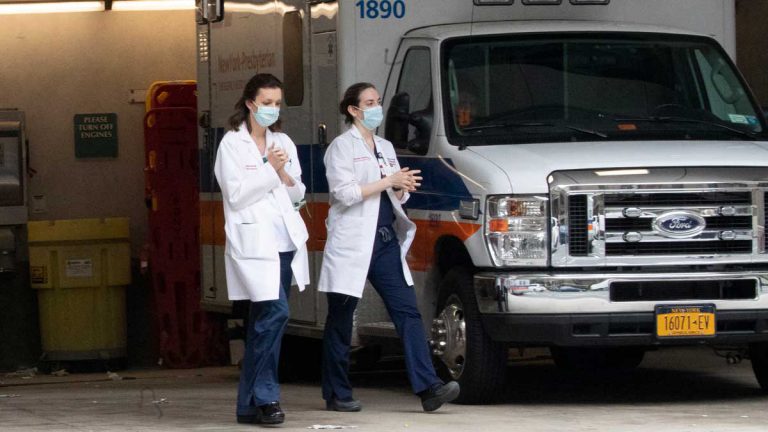Emergency physicians across Illinois are bracing for an onslaught of patients sick with the coronavirus disease COVID-19.
Dr. Ernest Wang, president of the Illinois College of Emergency Physicians, says hospitals across the state are preparing, and right now feels like the calm before the storm:
“The way I describe this to my friends and family: We’re on a surfboard and we’re watching these waves come,” says Wang, who is also a clinical professor and chief of emergency medicine at NorthShore University Health System in Evanston.
“We don’t know which wave is going to be the one we’re going to be hit by, we don’t know how big it’s going to be or how long it’s going to last, but we have to be ready at any time,” he says.
Emergency physicians on the front lines, caring for patients hospitalized for COVID-19, are at greater risk of being exposed to the virus.
Hundreds of new COVID-19 cases are being announced daily in Illinois. Statewide, 1,865 cases have been confirmed in 35 Illinois counties as of Wednesday afternoon. And in the past week, some Illinois hospitals have seen a sharp rise in the number of people coming into the ER with COVID-19 symptoms, Wang says.
The biggest problem right now, he adds, is the lack of widespread testing, both in Illinois and nationwide. The possibility hospitals will run out of protective gear is another major concern.
Wang says the best way the general public can help is by staying home as much as possible to help prevent hospitals from getting overwhelmed.
Wang spoke with Illinois Newsroom about how emergency physicians across the state are managing.
This interview has been lightly edited and condensed for clarity.
Christine Herman: What’s it like to be an emergency physician right now, when the risks of catching this illness are very real?
Dr. Ernest Wang: Every day I see these patients come in, I see them at the bedside. And it’s… you do the job, you swallow your fear, you swallow your anxiety. You gown up, and you go in and do the job. And that’s the soul of an emergency physician. It’s different from other areas of medicine. And I think you can’t do this job unless you’re able to do that effectively.
My colleagues and I have seen patients that are positive, and they’re coming in sicker, and we’re putting them on ventilators. And this is kind of the pattern, it’s starting to ramp up.
And my job is to protect my staff, keep the morale up, make sure that they can get everything they need. The important thing that I think that I’m trying to do is to brief everybody who has a situation where they’ve had a very difficult case, or they’ve had to have difficult conversations with family and put someone on a ventilator. It is not just the actual physical act of doing it; it’s everything that goes around it because of the unknowns.
CH: What are some of the biggest unknowns right now when it comes to being a healthcare worker on the front lines of this, in the ER?
EW: Well, number one: Am I going to get sick? Is my rationing of personal protective equipment the right thing? If I’m being asked to use my mask for weeks on end until it falls apart, you know, how effective is that? And is that morally the right thing for our government to be asking us to do?
Also, am I going to get sick from intubating a patient? Because we know that’s a risky situation, and am I do I have the right PPE to be able to do that safely?
There are some hospitals I’ve heard about that don’t even have N95 masks. And so, if you have to intubate someone with a standard mask, it puts you at higher risk. But it’s better than no mask.
And what if the standard gowns or gloves run out? That’s one of the main concerns that I hear every day, because we don’t know how long the supply is going to last.
That’s the thing, we don’t know how long this is going to last, what the peak is going to look like. And the everyday kind of anticipation of it, waiting and waiting, really is mentally draining, physically draining as well.
And if I get exposed, am I going to get it? If I’m carrying it and I’m asymptomatic, what if I give it to my staff, my kids, my other patients, you know? Do I need to quarantine myself from my family? These are the unknowns.
CH: We hear about how there’s a shortage of testing, and I understand NorthShore is one of more than a dozen Illinois hospital labs currently equipped with on-site testing. But many hospitals around the state don’t have that. How does the lack of widespread COVID-19 testing affect ER physicians across the state?
EW: Basically, we don’t know what the prevalence of this illness is in our populations. And so if you don’t know who has it, you can’t accurately quarantine, isolate those people, and then they’re going to spread it. If you don’t have adequate testing, you can’t effectively isolate and find new hotspots of the outbreak. The key is, if there’s an outbreak, you want to be able to just quickly quarantine people.
And we know that is effective, if you can get it early. But if you just kind of let it fester, then every person infects two to two-and-a-half other people, and the doubling rate is every two to three days. It rapidly spreads and then you lose that window of opportunity to contain it.
Follow Christine on Twitter: @CTHerman

